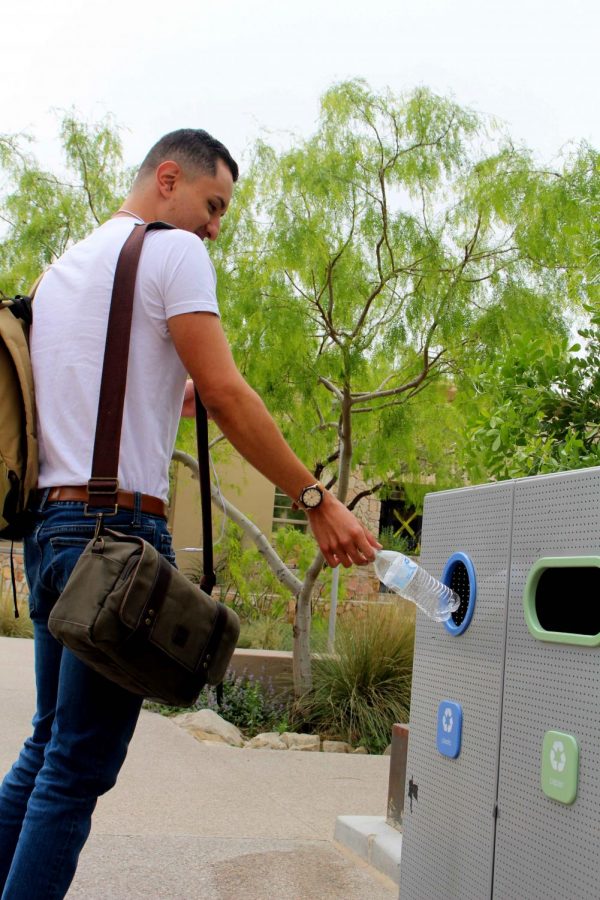With Earth Day around the corner, UTEP’s Waste Management Program has high hopes to inform the campus community on recycling and how students can contribute to make the Earth a little greener.
The UTEP Waste Management Program started back in 1998. Since then, the program has tried to implement better ways of recycling.
“In 2012, we made an attempt to implement the multi-stream recycling program which is a cleaner recycling program,” said Jesus Licona, assistant director for custodial and grounds. “(In) places like the Union and COBA (the College of Business Administration) you can find containers with four different bins – one for plastic, paper, trash and aluminum. This is multi-stream recycling.”
The buildings with multi-stream recycling were essentially testers to help promote this new, polished, way of recycling with an ultimate goal of implementing it across the whole campus.
According to UTEP’s waste management website, if 40,000 pounds of paper products are gathered each month through the help of students and faculty, 340 trees are saved.
According to Bloomber.com, recycling markets were upended in 2017 when China, as part of an anti-pollution crackdown, announced it would stop importing most used plastic and paper. This made recycling notably more expensive. For instance, plastic cannot be recycled separately unless it is shredded and baled.
“At that point, we ran into a few challenges, and recycling would have been expensive to implement a multi-stream level. Because of that, we decided to continue our single-stream system,” Licona said.
Single-stream recycling is a system where all types of recyclables such as plastics, paper, metals and glass are put into a single bin by consumers, which are then transported to a Material Recovery Facility (MRF) where they are sorted and processed.
“We still recycle. Although we mix the items, they are still recycled,” Licona said.
An observer on campus may believe that custodians do not separate the recycled items from the trash because they have one cart. But within that cart, there are two bags – one for trash and one for recyclables.
The largest problem waste management tackles is avoiding cross-contamination – the mixing of non-recyclable items with recyclable items.
“For example, if we have a container full of paper or bottles and someone throws food in that container, all of that must go to the landfill. Once something is contaminated, we have to throw the whole container to the landfill because it will not qualify as recyclables. Often times we find a lot of cross contamination and then we have to send it to the landfill,” Licona said.
One item that can no longer be recycled is shredded paper. Companies that recycle demand that shredded paper be baled which, unfortunately, UTEP’s campus does not have a baler. Bringing a baler onto campus is on waste management’s wish list.
“We usually try to educate everyone every Earth Week by doing different activities and putting up various booths, to try and inform people about everything that is going on,” said Shiela Awalt, assistant to the Facilities Management.
Earth Week on campus will kickoff April 15 and run through April 18 with various events, giveaways, interactive games and activities. With something to look forward to students and faculty should keep in mind that waste and recyclables contribute to this largely.
For information to learn how to recycle correctly visit utep.edu/vpba/facilities-management










